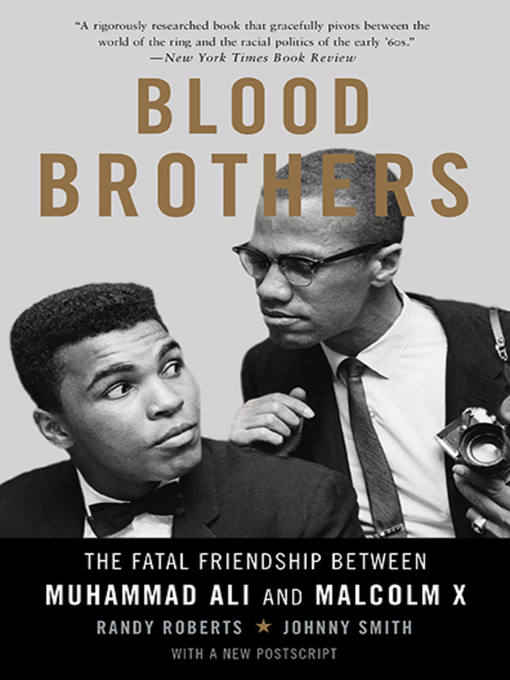
Blood Brothers
The Fatal Friendship Between Muhammad Ali and Malcolm X
- اطلاعات
- نقد و بررسی
- دیدگاه کاربران
نقد و بررسی

December 21, 2015
In this provocative history, sports historians Roberts and Smith examine the relationship between two central figures of the 1960s: Malcolm X and Muhammad Ali. The day after Cassius Clay’s unlikely upset of Sonny Liston for the heavyweight title, he shook up the world one more time by pledging allegiance to the Nation of Islam. In the eyes of America, Clay’s transformation into Muhammad Ali was blamed on the man who had stood at his side over the previous months: the notorious NOI minister Malcolm X. The truth, as Roberts and Smith make pellucid, was far more complex. Ali spurned Malcolm for the Nation, and Ali’s meteoric rise makes a disturbing contrast to the persecution and murder of his former mentor and friend. Roberts and Smith map the relationship between the troubled icons in painstaking detail and debunk long-held assumptions about their break. At the same time, they too easily assign motivations and opinions to both men that, while intriguing, seem largely speculative. Malcolm may indeed have seen Ali as his path to reaching a larger audience, but it’s hard to believe that the activist was as naive about the boxer as the authors make him out to be. Nevertheless, Roberts and Smith bring a fresh perspective to the story in the civil rights movement, and capture the ferment of the broader era. Christy Fletcher, Fletcher and Co.

Starred review from December 15, 2015
How Cassius Clay became Muhammad Ali and then an enemy of his mentor and friend Malcolm X. These two titanic lives intersected for less than two years, with huge consequences for each man. Malcolm X, the Nation of Islam's most visible minister and spokesman, confirmed the young Clay's deep suspicions about the white man and wooed him for the Nation. Malcolm's incendiary rhetoric astonished Clay, who believed God protected him. How else could Malcolm be so bold and remain alive? In the run-up to Clay's historic upset of champion Sonny Liston, Malcolm filled the young boxer with confidence, privately advised him, supplied him with a business adviser, and shared many meals and moments of intimate family time. Malcolm loved Clay and quickly understood his potential cultural impact and the glittering youth's value as a propaganda tool for the sclerotic Nation. When Clay denounced his "slave name" and was anointed as Muhammad Ali, Malcolm understood he'd lost an intense power struggle with the Nation's leader, Elijah Muhammad, and that it was only a matter of time before he'd be killed. Roberts (History/Purdue Univ.; A Team for America: The Army-Navy Game that Rallied a Nation at War, 2011, etc.) and Smith (American History/Georgia Tech; The Sons of Westwood: John Wooden, UCLA, and the Dynasty that Changed College Basketball, 2013, etc.) minutely examine the construction and tortured dissolution of this friendship, highlighting the influence of their fathers on their sensitive sons and the varying masks they adopted to navigate their worlds of prizefighting and politics. Backdropping the authors' main tale are incisive looks at Ali's showmanship, his almost single-handed resurrection of boxing, and the befuddlement of sportswriters confronted with his conversion. They sharply detail Malcolm's growing disillusionment with Elijah, his heartbreak at the loss of Ali's allegiance, and the ugly dynamic within the Nation that left the defiant minister murdered. A page-turning tale from the 1960s about politics and sports and two proud, extraordinary men whose legacies endure.
COPYRIGHT(2015) Kirkus Reviews, ALL RIGHTS RESERVED.

Starred review from January 1, 2016
Shortly before becoming heavyweight champion of the world in 1964, Cassius Clay Jr. (b. 1942) became involved with the black supremacist sect, the Nation of Islam. Malcolm X (1925-65), a fiery though thoughtful minister within the sect, formed a symbiotic relationship with Clay. Malcolm helped Clay develop as a worldwide figure, and having Clay as a protege served the ambitious Malcolm. Over time, Clay, who changed his name to Muhammad Ali, had to choose between Malcolm and Elijah Muhammad, the aging and less charismatic leader of the Nation of Islam. Coauthors Roberts (history, Purdue Univ.) and Smith (history, Georgia Tech Univ.) argue that in losing Ali, Malcolm lost the centerpiece of his ascendance and then his protective cover; within months Malcolm was assassinated by his former cohorts. VERDICT This book offers a significant contribution to serious studies of Malcolm X, Muhammad Ali, and the Nation of Islam.--Jim Burns, formerly with Jacksonville P.L.
Copyright 2016 Library Journal, LLC Used with permission.

Starred review from February 1, 2016
Sports historians Roberts (Rising Tide, 2013) and Smith (The Sons of Westwood, 2013) delve deeply into the little-known intricacies and tragic consequences of the close bond between the mentoring Nation of Islam minister Malcolm X and the young boxer Cassius Clay. As the authors tell the gripping personal stories of these two passionate revolutionaries and seekers, they cover with both anecdotal panache and analytical insight Clay's genius for audacious self-promotion and strategic self-concealment, and Malcolm X's dream of resolving his increasingly dire conflict with the Nation of Islam leader Elijah Muhammad by bringing Clay and his burgeoning international fame fully into the fold. Vividly set within the coalescing civil rights movement, this incisive anatomy of a fatal friendship turns on the bitter irony that Clay, soon to become Muhammad Ali, and Malcolm X became brothers in spirit by virtue of their shared insistence on equality and freedom in a racist society, only to be drawn to the Nation of Islam, which betrayed and terrorized them both, forcing them apart and ultimately murdering Malcolm X. Roberts and Smith portray both of these courageous and controversial, inspired and inspiring men with fresh, stinging clarity, and extend our perception of the interconnectivity of race, religion, sports, and media during this violent and transformative era, which is so very germane today.(Reprinted with permission of Booklist, copyright 2016, American Library Association.)




دیدگاه کاربران